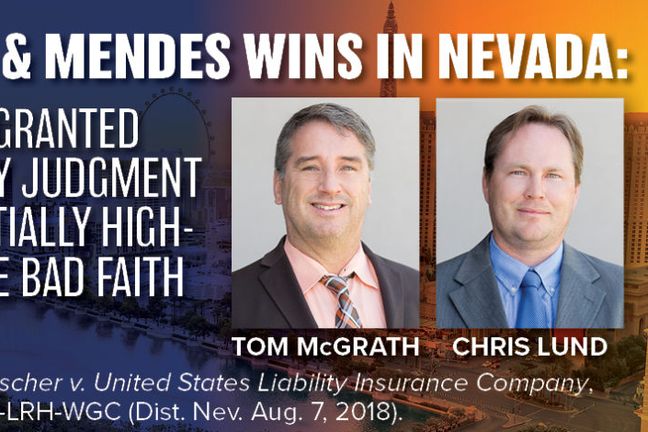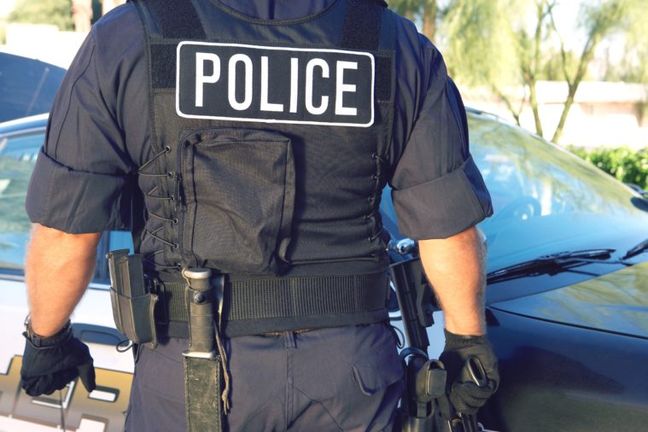Anderson Keuscher v. United States Liability Insurance Company, 3:17-cv-00455-LRH-WGC (Dist. Nev. Aug. 7, 2018).
Last month the federal district court of Nevada granted United States Liability Insurance Company (USLI) summary judgment in an action filed against USLI for bad faith denial of a claim. Tyson & Mendes represented USLI in this case. The lawsuit centered around USLI’s denial of coverage for damage to the claimant’s property based on exclusionary language found in the insurance policy.
Background
On February 12, 2017, an employee at the law firm of Anderson Keuscher (the “Claimant”) came to work and found a toilet had overflowed. Water from the toilet caused damage to the floor, drywall, and other areas of the property. After the overflow, the Claimant submitted a damage claim to USLI, based on the Claimant’s insurance policy with USLI (the “Policy”).
USLI investigated the facts of the claim and reviewed the reports of a plumber who diagnosed the cause of the toilet overflow. The plumber determined a tree root on the Claimant’s property had “penetrated into the sewer [pipe] causing back up issues.” After completing its investigation into the facts of the claim, USLI denied coverage based on the exclusions contained in the Policy.
Subsection (I)(B)(1)(g)(3) of the Policy expressly provided exclusion from coverage caused by the following: “Water that backs up or overflows or is otherwise discharged from a sewer, drain, sump, sump pump or related equipment.” USLI determined that since the injury to the Claimant’s property was caused by water that backed up or overflowed or was discharged from a sewer or drain, the Claimant’s policy did not cover the resultant damage.
The Claimant’s Lawsuit
After USLI denied coverage, the Claimant filed a lawsuit, asserting four causes of action against USLI: (1) breach of insurance contract, (2) breach of NRS 686A.310- unfair practices in settling claims, (3) breach of fiduciary duty between insurer and insured, and (4) bad-faith refusal to pay insurance claim. The Claimant’s main contention for bringing the lawsuit was USLI should cover the loss because the water that overflowed from the toilet did not backup from the city sewer main. Despite no mention of the city sewer main in the USLI insurance policy, the Claimant’s argument stemmed from a few cases outside of Nevada in which the courts interpreted policy language that was superficially similar to the USLI policy but more narrowly written.
The Claimant cited Monteleone v. The Auto Club Grp., 113 F. Supp. 3d 950, 959 (E.D. Mich. 2015) in which the plaintiff incurred water damage to his property due to a fault in his plumbing waste line that caused water to discharge and overflow in his basement. The Monteleone policy distinguished between plumbing issues and sewer line backups. One provision provided coverage for: “Accidental discharge or overflow of water or steam from within a plumbing, heating, air conditioning or automatic fire protection sprinkler system or domestic appliance.” Another provision excluded coverage of: “water or water-borne material which backs up through sewers or drains or water which enters into and overflows from within a sump pump, sump pump well or other type system designed to remove subsurface water which is drained from the foundation area.” Ultimately, the Monteleone court found it significant that the policy distinguished between coverage for plumbing failures and coverage for water backing up from a sewer or drain. Since the water damage at issue was caused by a plumbing failure, it found the plaintiff’s damage was a covered loss.
The Claimant also relied on the case Pichel v. Dryden Mult. Ins. Co., 117 A.D. 3d 1267 (2014), in which the plaintiff sustained water damage to his apartment building “when waste water entered the first-floor apartments through, among other things, toilets, bathtubs and condensation drains.” However, the policy at issue in Pichel only excluded coverage for “back ups through sewers or drains” and did not contain language excluding coverage for “overflows” caused from the plumbing system on the insured’s property. The court in Pichel found the policy ambiguous regarding whether it excluded damage caused by water that backs up from the plumbing system on the insured’s property so it looked to similar cases in other jurisdictions. The Pichel court agreed with the decisions of other courts which:
stand for the proposition that water damage caused by a backup/overflow that originates from a pipe or clogged drain located within the insured’s property line comes from the insured’s plumbing system and is covered by the policy; conversely, if the cause of the backup/overflow is from outside the insured’s property boundaries — such as a clogged municipal sewer that forces water from outside the insured’s plumbing system to overflow — the sewer or drain exclusion is applicable.
The Claimant in the present case argued the same reasoning in Pichel and Monteleone should apply and USLI must cover the Claimant’s loss.
Tyson & Mendes’ Defense
After the Claimant filed its lawsuit, USLI retained Tyson & Mendes to defend against the allegation USLI should have provided coverage. After reviewing the Claimant’s arguments, Tyson & Mendes determined USLI’s policy contained a broader exclusion than those in the cases cited by the Claimant. USLI’s policy excluded damage from water that backs ups or overflows. Again, the USLI policy expressly provides exclusion from coverage caused by “water that backs up or overflows or is otherwise discharged from a sewer, drain, sump, sump pump or related equipment.” Furthermore, a separate provision provides:
We will not pay for loss or damage caused directly or indirectly by any of the following. Such loss or damage is excluded regardless of any other cause or event that contributes concurrently or in any sequence to the loss. These exclusions apply whether or not the loss event results in widespread damage or affects a substantial area.
The express and unambiguous language above, excludes coverage for any damage caused by “water that backs up or overflows…from a sewer, drain, sump, sump pump or related equipment” even if the damage also resulted from a concurrent cause. The problem was there was no case law in Nevada to support USLI’s and Tyson & Mendes’ position. Therefore, Tyson & Mendes looked to other jurisdictions and found case law directly on point.
One such case directly on point was in California, Cardio Diagnostic Imaging, Inc. v. Farmers Ins. Exch., 212 Cal. App. 4th 69, 71, 150 Cal. Rptr. 3d 798, 799 (2012). In Cardio, the court construed a policy that excluded any “loss or damage caused directly or indirectly by … [w]ater that backs up or overflows from a sewer, drain or sump.” The insured’s business premises and property were extensively damaged when water overflowed from a toilet in an upstairs suite. An investigation revealed a sewer line blockage approximately 20 to 40 feet away from the toilet, on the insured’s property, caused the water in the toilet to overflow. The insurer denied coverage based upon the policy exclusion and the insured sued the insurer for breach of contract and bad faith. The parties cross-moved for summary judgment and the trial court granted summary judgment in the insurer’s favor.
The insured in Cardio appealed and the Court of Appeals affirmed the trial court’s decision. The Court of Appeals found the exclusion unambiguous, reasoning a layperson would understand it to include both water that comes up out of a sewer, drain, or sump (“backs up”) and water that spills over from a sewer, drain, or sump (“overflows”) due to a blockage. In reaching this conclusion, the Court of Appeals distinguished other cases interpreting exclusions that refer only to water that “backs up and overflows” rather than “backs up or overflows.” The Court of Appeals noted the fact the water overflowed from a toilet, and not a drain, made no difference. The toilet was attached to the drain. Water that enters the toilet, the court explained, flows through the drain into pipes that lead to the sewer system.
The Nevada Federal Court’s Decision
Armed with similar case law it found in other jurisdictions interpreting similar exclusionary provisions, on January 12, 2018, Tyson & Mendes filed a motion for summary judgment on behalf of USLI which was granted on August 7, 2018, by the federal district court of Nevada. In its memorandum and order, the court found the language of the USLI exclusionary provision unambiguous and explained:
The language of the exclusion provision in Section I(B)(1) is unambiguous on its face. The provision clearly states that USLI will not pay for damages caused by water that backs up or overflows from a sewer or a drain. Here, the plumber identified a tree root that caused a blockage in the sewer line on the property. The blockage caused a backup that resulted in water overflowing from a toilet, which is connected to a drain, in [the Claimant’s] law firm. Thus, the provision clearly excludes coverage for the circumstances giving rise to the property damage in this matter… The court therefore finds that the policy plainly applies to the damages caused by the water that was backed up in a sewer line on the property and overflowed from a drain attached to a toilet on the property.
At the end of the court’s opinion, it dismissed all claims against USLI and closed the case.
Significance
In most jurisdictions, it can be tricky for an insurance company to deny coverage for a loss. Nevada is no exception where “[c]lauses providing coverage are broadly interpreted so as to afford the greatest possible coverage to the insured;” and “Clauses excluding coverage are interpreted narrowly against the insurer.” Century Sur. Co. v. Casino W., Inc., 329 P.3d 614, 616 (Nev. 2014). There are many real property insurance policies containing exclusionary language similar to or exactly like USLI’s policy. USLI’s current victory is significant because it removes some of the ambiguity for insurance adjusters, who will likely analyze similar claimed losses in the future and be able to better determine whether such losses are covered by the policy.
Furthermore, although the order granting USLI’s motion for summary judgment is considered “unpublished” in judicial terms, it will soon be readily available for review on all legal research websites. In most jurisdictions, these unpublished orders can be cited for their persuasive value. Thus, when an insurance carrier denies a similar claim in Nevada, it has case law within the state to strengthen its position that its denial of coverage was in good faith.

 Author: Christopher Lund
Author: Christopher Lund
 Cannabis Workers Allege Quota to Trim 4 Pounds a Day Violates the California Labor Code
Cannabis Workers Allege Quota to Trim 4 Pounds a Day Violates the California Labor Code
 The Ninth Circuit Reminds Us: Every Word Matters
The Ninth Circuit Reminds Us: Every Word Matters
 NO WAY, PRO SE! The Consequences of Abusing the Judicial System as a Pro Se Litigant in Colorado
NO WAY, PRO SE! The Consequences of Abusing the Judicial System as a Pro Se Litigant in Colorado
 Victim of Financial Mismanagement or Unlawful Retaliation? New Jersey City University Program Founder Claims School Retaliated After Reporting Alleged Sexual Harassment
Victim of Financial Mismanagement or Unlawful Retaliation? New Jersey City University Program Founder Claims School Retaliated After Reporting Alleged Sexual Harassment
 “Real Housewives” Gets a Reality Check
“Real Housewives” Gets a Reality Check
 Missing a Chapter: Insufficiency of Expert Deposition Testimony in Medical Malpractice Litigation
Missing a Chapter: Insufficiency of Expert Deposition Testimony in Medical Malpractice Litigation
 Crash Course: Why Summary Judgment Misses the Mark in Illinois Multi-Cause Limousine Crash Collision
Crash Course: Why Summary Judgment Misses the Mark in Illinois Multi-Cause Limousine Crash Collision
 Bitter Truths: Lead, Cadmium, and Defective Pleadings in California Chocolate Class Action
Bitter Truths: Lead, Cadmium, and Defective Pleadings in California Chocolate Class Action
 The Law of Unintended Consequences: Including Insurance Brokers in Litigation Strategy Communication May Waive the Attorney-Client Privilege
The Law of Unintended Consequences: Including Insurance Brokers in Litigation Strategy Communication May Waive the Attorney-Client Privilege
 Federal Judge Throws Out Portion of Coverage Lawsuit in Nevada
Federal Judge Throws Out Portion of Coverage Lawsuit in Nevada
 Defenses Raised in an Answer Can Be Waived if Not Timely Reaffirmed in Discovery
Defenses Raised in an Answer Can Be Waived if Not Timely Reaffirmed in Discovery
 Nevada Court of Appeals Refuses to Define Breach of the Peace for Self-Help Repossession
Nevada Court of Appeals Refuses to Define Breach of the Peace for Self-Help Repossession
 Defendants Entitled to Attorney Fees as Prevailing Party in Voluntary Dismissal Cases Under Certain Circumstances
Defendants Entitled to Attorney Fees as Prevailing Party in Voluntary Dismissal Cases Under Certain Circumstances
 Nevada Limits Access to Police Body Camera Footage
Nevada Limits Access to Police Body Camera Footage
 Nevada Clarifies Exceptions to the American Rule of Attorney Fees
Nevada Clarifies Exceptions to the American Rule of Attorney Fees
 Actual Notice and Mailing Checks in Nevada
Actual Notice and Mailing Checks in Nevada
 Jury Demand within Complaint is Insufficient in Nevada
Jury Demand within Complaint is Insufficient in Nevada